|
|
|
Sort Order |
|
|
|
Items / Page
|
|
|
|
|
|
|
| Srl | Item |
| 1 |
ID:
145526
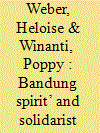

|
|
|
|
|
| Summary/Abstract |
It must come as no surprise that traces of any continuing relevance of the ‘Bandung spirit’ are enthusiastically being sought in the wake of the sixtieth anniversary of the Asian-African Conference. It was the first high-profile formal conference of newly independent (or ‘about-to-be independent’) post-colonial states at a rather momentous historical conjuncture: the continuing struggles for decolonisation were pronounced in the context of the Cold War. The Final Communiqué of the Bandung conference strongly articulated a collective political project against colonialism and imperialism, and for self-determination and racial equality, while already laying the foundations for the idea of strategic non-alignment in the context of the Cold War. It is in this sense that the Bandung conference has come to be emblematic of an event that inaugurated a radically different international political landscape to the immediate post-1945 world order. In this article, the authors focus specifically on the development aspirations articulated at the Asian-African Conference in Bandung, which they argue are the site of struggles and contradictions. As the authors show, the ‘Bandung spirit’ underlined the political project of Third Worldism, as well as the call for a new international economic order in the 1970s. Yet, they also identify some constraints and contradictions that the ‘Bandung spirit’ had to navigate and the challenges it was up against. In the final part of the article, the authors briefly discuss the extent to which the ‘Bandung spirit’ continues to resonate in contemporary global politics of development.
|
|
|
|
|
|
|
|
|
|
|
|
|
|
|
|
| 2 |
ID:
069167
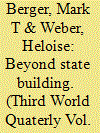

|
|
|
| 3 |
ID:
061091
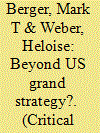

|
|
|
| 4 |
ID:
158668


|
|
|
|
|
| Summary/Abstract |
As students and scholars of global politics, we have been witnessing, participating in, and feeling the effects of recent global upheavals. These include specific events, such as the election of Trump and the vote for Brexit, but are better understood through their resulting political effects (e.g., pushing back on migration, hardening national borders, denying climate change, reneging on trade deals, gutting the welfare state, increasing resource extraction, and curtailing rights). Commentators refer to these upheavals in different ways: a rise in populism, reinvigorated nationalism, the new fascism, a polarization of Right and Left, the end of globalization, and posttruth politics. These labels have not only generated a great deal of scholarly debate, they have also helped generate multiple energies, including activism, protest, and politicization. Such developments feel at once totally unprecedented but also eerily familiar. More to the point, they have very different manifestations in different parts of the world; indeed, one of the difficulties of the present moment is the lack of analysis about the global ramifications of these upheavals.
|
|
|
|
|
|
|
|
|
|
|
|
|
|
|
|
| 5 |
ID:
094031


|
|
|
|
|
| Publication |
2010.
|
| Summary/Abstract |
This article offers a political analysis of development and poverty reduction initiatives from a social-relational perspective. More specifically, the author draws on the example of microfinance schemes to illustrate the way in which poverty reduction policy is increasingly advanced in response to social resistance to experiences of destitution, which is itself produced through development. The perspective the author advances disrupts conventional framings of development and poverty in terms of independent domains abstracted from social relations of power and resistances. Furthermore, it brings into view the global dimension of these social relations, articulated and co-constituted through a range of actors across different levels of governance. Through the social-relational lens, the development paradox is also revealed: development processes have produced destitution which, in turn, becomes the target of poverty reduction ('development') initiatives, which are themselves yet again premised upon either realising economic growth or maintaining, at a fundamental level, social relations of inequality and dispossession. This paradox is neither explicable nor discernable from orthodox conceptions of the international political economy of development.
|
|
|
|
|
|
|
|
|
|
|
|
|
|
|
|
| 6 |
ID:
192314
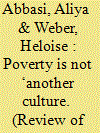

|
|
|
|
|
| Summary/Abstract |
Well-being and protection of all children have widely been associated with universal rights. Simultaneously, though, there is growing advocacy for a right of children to work to live. Drawing on cultural relativist premises, such advocacy strongly correlates with an acceptance of poverty as a condition that is inevitable or simply ‘given’. We advance an argument against a right of children to work to live. The fact that only poor children are compelled to work should direct analyses to the causes of poverty. A critical engagement with the politics of development is necessary as it is often constitutive of relations of impoverishment. We critique Eurocentric perspectives that advocate for child labour and substantiate our argument by drawing on the case example of Bolivia, which lowered the legal age for child labour, only to eventually retract this decision. We demonstrate the link between neoliberal development and a rapid increase in the number of children forced to work to live since the 1980s. The case for a right of children to work to live is not justifiable; but there is a case for abolishing child labour and upholding the right of all children and their families to live in dignity. Poverty is not ‘another culture’.
|
|
|
|
|
|
|
|
|
|
|
|
|
|
|
|
| 7 |
ID:
085908
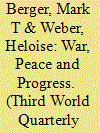

|
|
|
|
|
| Publication |
2009.
|
| Summary/Abstract |
The theory and practice of development has a complicated relationship to the history of war and peace in the 20th century. Efforts to realise the promise of progress have been played out against the backdrop of the crisis of colonialism, national liberation, decolonisation and the rise and fall of Third Worldism. Third Worldism, conceptualised as a specific project to realise the promises of progress, was also affected by the transformation and onset of the crisis of the nation-state system and the re-calibration of the development-security nexus in the post-Cold War era. The short history of the 'three worlds of development' appears now to have been overlaid by global development; that is, a process which entails intensified social and political network-relations, with accompanying regulatory efforts becoming more global in scope and reach. Yet, the most influential drivers and proponents of 'progress' continue to focus on the nation-state as the natural mechanism for the realisation of development, security and to some extent the protection of human rights. A critical reinterpretation, however, of the struggles engendered by this constellation suggests that they are better viewed as struggles for recognition (and redistribution) rather than driven by realising statehood per se. Concurrently, development as an internationally framed global project (underpinned by neoliberalism) has coexisted with alternative conceptions. Collectively, the latter hold out a range of paths-to-progress not-yet-taken at a systemic level, and flag the everyday struggles of denigrated multitudes. This special 30th anniversary issue brings together contributions that seek to revisit the dynamics and complexities of the history of war and peace in relation to the pursuit of progress. The issue as a whole foregrounds contemporary crises of violence and insecurity in relation to core organising principles of world politics; the nation state and the inter-state system and underlying assumptions to realise the promises of progress. That this project is beset with crises and contradictions is recognised by both its advocates and critics. However, there is no consensus on either causal dynamics or potential solutions, despite common acknowledgements of the complexities involved. The first part of this introduction broadly examines the 'crisis' of the state and brings to the fore the need to appreciate the dynamics of social and psychological aspects of these struggles. The second part focuses on the contours of the 'crisis' of global development.
|
|
|
|
|
|
|
|
|
|
|
|
|
|
|
|
|
|
|
|
|